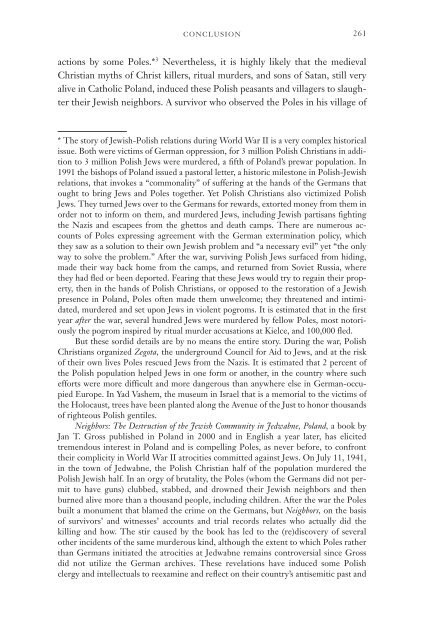41845358-Antisemitism
41845358-Antisemitism
41845358-Antisemitism
Create successful ePaper yourself
Turn your PDF publications into a flip-book with our unique Google optimized e-Paper software.
CONCLUSION<br />
261<br />
actions by some Poles.* 3 Nevertheless, it is highly likely that the medieval<br />
Christian myths of Christ killers, ritual murders, and sons of Satan, still very<br />
alive in Catholic Poland, induced these Polish peasants and villagers to slaughter<br />
their Jewish neighbors. A survivor who observed the Poles in his village of<br />
* The story of Jewish-Polish relations during World War II is a very complex historical<br />
issue. Both were victims of German oppression, for 3 million Polish Christians in addition<br />
to 3 million Polish Jews were murdered, a fifth of Poland’s prewar population. In<br />
1991 the bishops of Poland issued a pastoral letter, a historic milestone in Polish-Jewish<br />
relations, that invokes a “commonality” of suffering at the hands of the Germans that<br />
ought to bring Jews and Poles together. Yet Polish Christians also victimized Polish<br />
Jews. They turned Jews over to the Germans for rewards, extorted money from them in<br />
order not to inform on them, and murdered Jews, including Jewish partisans fighting<br />
the Nazis and escapees from the ghettos and death camps. There are numerous accounts<br />
of Poles expressing agreement with the German extermination policy, which<br />
they saw as a solution to their own Jewish problem and “a necessary evil” yet “the only<br />
way to solve the problem.” After the war, surviving Polish Jews surfaced from hiding,<br />
made their way back home from the camps, and returned from Soviet Russia, where<br />
they had fled or been deported. Fearing that these Jews would try to regain their property,<br />
then in the hands of Polish Christians, or opposed to the restoration of a Jewish<br />
presence in Poland, Poles often made them unwelcome; they threatened and intimidated,<br />
murdered and set upon Jews in violent pogroms. It is estimated that in the first<br />
year after the war, several hundred Jews were murdered by fellow Poles, most notoriously<br />
the pogrom inspired by ritual murder accusations at Kielce, and 100,000 fled.<br />
But these sordid details are by no means the entire story. During the war, Polish<br />
Christians organized Zegota, the underground Council for Aid to Jews, and at the risk<br />
of their own lives Poles rescued Jews from the Nazis. It is estimated that 2 percent of<br />
the Polish population helped Jews in one form or another, in the country where such<br />
efforts were more difficult and more dangerous than anywhere else in German-occupied<br />
Europe. In Yad Vashem, the museum in Israel that is a memorial to the victims of<br />
the Holocaust, trees have been planted along the Avenue of the Just to honor thousands<br />
of righteous Polish gentiles.<br />
Neighbors: The Destruction of the Jewish Community in Jedwabne, Poland, a book by<br />
Jan T. Gross published in Poland in 2000 and in English a year later, has elicited<br />
tremendous interest in Poland and is compelling Poles, as never before, to confront<br />
their complicity in World War II atrocities committed against Jews. On July 11, 1941,<br />
in the town of Jedwabne, the Polish Christian half of the population murdered the<br />
Polish Jewish half. In an orgy of brutality, the Poles (whom the Germans did not permit<br />
to have guns) clubbed, stabbed, and drowned their Jewish neighbors and then<br />
burned alive more than a thousand people, including children. After the war the Poles<br />
built a monument that blamed the crime on the Germans, but Neighbors, on the basis<br />
of survivors’ and witnesses’ accounts and trial records relates who actually did the<br />
killing and how. The stir caused by the book has led to the (re)discovery of several<br />
other incidents of the same murderous kind, although the extent to which Poles rather<br />
than Germans initiated the atrocities at Jedwabne remains controversial since Gross<br />
did not utilize the German archives. These revelations have induced some Polish<br />
clergy and intellectuals to reexamine and reflect on their country’s antisemitic past and


